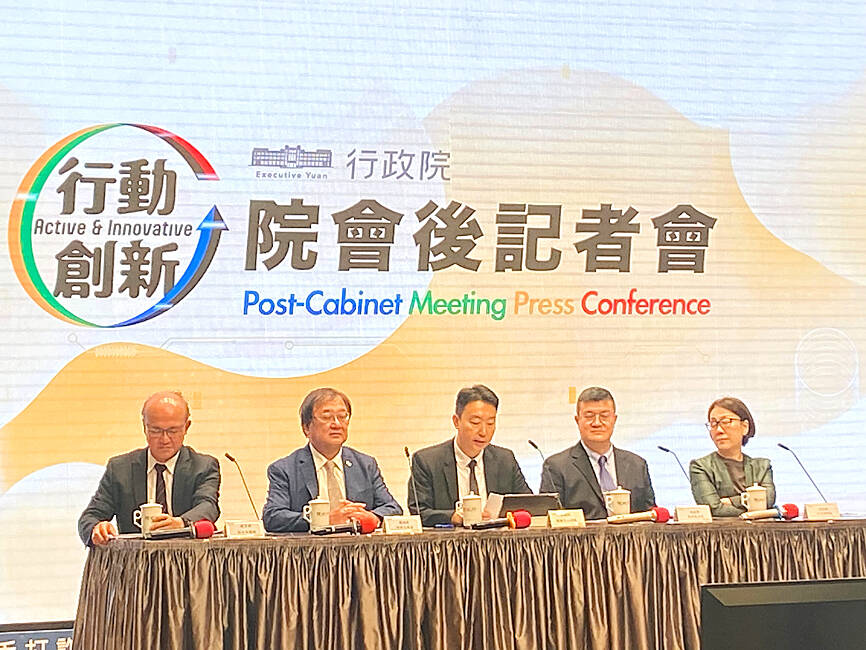The Cabinet yesterday passed a proposal to fund new cancer medicines and would allocate NT$5 billion (US$153.82 million) from next year’s budget to the program.
As cancer has long been the leading cause of death in Taiwan, the Cabinet approved the proposal from the Ministry of Health and Welfare to “raise the accessibility of new cancer medicines” in line with the national cancer control program.
The plan is part of President William Lai’s (賴清德) “Healthy Taiwan” policy, with the aim of reducing cancer deaths by one-third by 2030.

Photo: Chung Li-hua, Taipei Times
To meet the medicinal needs of people with cancer, the ministry would set up a national institute to assess health technology — which would be a non-departmental public body — launch a parallel review system and establish a fund for new cancer drugs, National Health Insurance Administration (NHIA) Director-General Shih Chung-liang (石崇良) told a news conference after the Cabinet meeting.
The Executive Yuan would allocate NT$5 billion from the official budget to the National Health Insurance fund as a fund for temporary new cancer drugs, which is expected to eventually reach and remain at NT$10 billion, Minister of Health and Welfare Chiu Tai-yuan (邱泰源) said.
While some of the funds would be allocated to the NHI fund in the short term, amendments to the Cancer Control Act (癌症防治法) would be formulated to stabilize financial sources of the new medicines fund in the medium and long term, Shih said.
The budget would be the main source of funding, which is projected to reach NT$10 billion within three years, he said, adding that medicine reviews, financial controls, eligibility evaluations and information openness would be established to ensure the program’s effectiveness.
Executive Yuan spokesman Chen Shi-kai (陳世凱) quoted Premier Cho Jung-tai (卓榮泰) as saying that the ministry should accelerate the fund’s establishment to ensure stable payments for new medicines, as well as safeguard the right of the public to medicine.
Meanwhile, the budget for cancer screening programs would receive a NT$4 billion boost to NT$6.8 billion next year, while eligibility would be expanded for government-funded screenings for cervical, colorectal, breast, lung and gastric cancers, Shih said, adding that screening subsidy rules would be changed.
Eligibility would be expanded to offer government-funded lung cancer screenings for people who smoke at least 20 packs of cigarettes per year or have a family history of lung cancer, the NHIA said.
Other expanded eligibility conditions include: breast cancer screenings for women aged 40 to 74, up from 45 to 70 previously; cervical cancer screenings for women from age 25, down from 29; colorectal cancer screenings from age 45, down from 49, or from 40, down from 44 for those with a family history of the disease; HPV testing at age 35, 45 and 65; Helicobacter pylori stool antigen testing for people aged 45 to 74; and continued enhancement of cancer screenings and follow-up checks for positive cases, it said.
To achieve the goal of a “Healthy Taiwan,” the ministry should enhance its development and implementation of public health policies that incorporate exercise and nutrition management, Chen quoted Cho as saying, adding that the application of artificial intelligence should be considered to increase precision and efficiency.

The Central Election Commission has amended election and recall regulations to require elected office candidates to provide proof that they have no Chinese citizenship, a Cabinet report said. The commission on Oct. 29 last year revised the Measures for the Permission of Family-based Residence, Long-term Residence and Settlement of People from the Mainland Area in the Taiwan Area (大陸地區人民在台灣地區依親居留長期居留或定居許可辦法), the Executive Yuan said in a report it submitted to the legislature for review. The revision requires Chinese citizens applying for permanent residency to submit notarial documents showing that they have lost their Chinese household record and have renounced — or have never

A magnitude 5.6 earthquake struck off the coast of Yilan County at 12:37pm today, with clear shaking felt across much of northern Taiwan. There were no immediate reports of damage. The epicenter of the quake was 16.9km east-southeast of Yilan County Hall offshore at a depth of 66.8km, Central Weather Administration (CWA) data showed. The maximum intensity registered at a 4 in Yilan County’s Nanao Township (南澳) on Taiwan’s seven-tier scale. Other parts of Yilan, as well as certain areas of Hualien County, Taipei, New Taipei City, Taoyuan, Hsinchu County, Taichung and Miaoli County, recorded intensities of 3. Residents of Yilan County and Taipei received

Taiwan has secured another breakthrough in fruit exports, with jujubes, dragon fruit and lychees approved for shipment to the EU, the Ministry of Agriculture said yesterday. The Animal and Plant Health Inspection Agency on Thursday received formal notification of the approval from the EU, the ministry said, adding that the decision was expected to expand Taiwanese fruit producers’ access to high-end European markets. Taiwan exported 126 tonnes of lychees last year, valued at US$1.48 million, with Japan accounting for 102 tonnes. Other export destinations included New Zealand, Hong Kong, the US and Australia, ministry data showed. Jujube exports totaled 103 tonnes, valued at

BIG SPENDERS: Foreign investors bought the most Taiwan equities since 2005, signaling confidence that an AI boom would continue to benefit chipmakers Taiwan Semiconductor Manufacturing Co’s (TSMC, 台積電) market capitalization swelled to US$2 trillion for the first time following a 4.25 percent rally in its American depositary receipts (ADR) overnight, putting the world’s biggest contract chipmaker sixth on the list of the world’s biggest companies by market capitalization, just behind Amazon.com Inc. The site CompaniesMarketcap.com ranked TSMC ahead of Saudi Aramco and Meta Platforms Inc. The Taiwanese company’s ADRs on Tuesday surged to US$385.75 on the New York Stock Exchange, as strong demand for artificial intelligence (AI) applications led to chip supply constraints and boost revenue growth to record-breaking levels. Each TSMC ADR represents